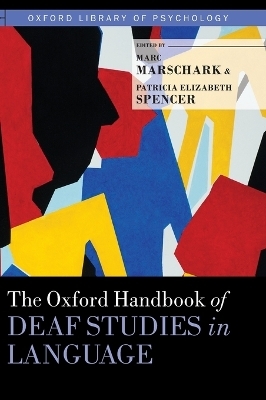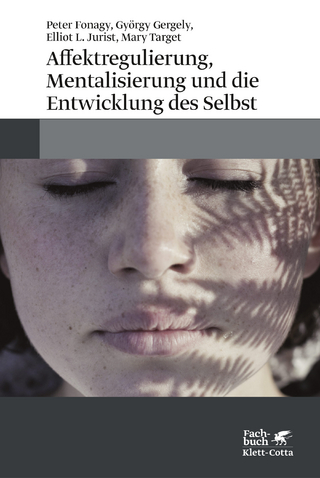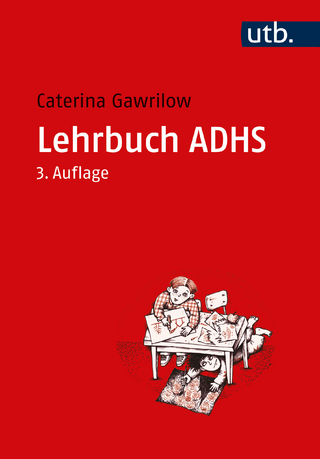
The Oxford Handbook of Deaf Studies in Language
Oxford University Press (Verlag)
978-0-19-024141-4 (ISBN)
Language development, and the challenges it can present for individuals who are deaf or hard-of-hearing, have long been a focus of research, theory, and practice in D/deaf studies and deaf education. Over the past 150 years, but most especially near the end of the 20th and beginning of the 21st century, advances in the acquisition and development of language competencies and skills have been increasing rapidly.
This volume addresses many of those accomplishments as well as remaining challenges and new questions that have arisen from multiple perspectives: theoretical, linguistic, social-emotional, neuro-biological, and socio-cultural. The contributors comprise an international group of prominent scholars and practitioners from a variety of academic and clinical backgrounds. The result is a volume that addresses, in detail, current knowledge, emerging questions, and innovative educational practice in a variety of contexts. The volume takes on topics such as discussion of the transformation of efforts to identify a "best" language approach (the "sign" versus "speech" debate) to a stronger focus on individual strengths, potentials, and choices for selecting and even combining approaches; the effects of language on other areas of development as well as effects from other domains on language itself; and how neurological, socio-cognitive, and linguistic bases of learning are leading to more specialized approaches to instruction that address the challenges that remain for deaf and hard-of-hearing individuals. This volume both complements and extends The Oxford Handbook of Deaf Studies and Deaf Education, Volumes 1 and 2, going further into the unique challenges and demands for deaf or hard-of-hearing individuals than any other text and providing not only compilations of what is known but setting the course for investigating what is still to be learned.
Marc Marschark is a Professor at the National Technical Institute for the Deaf, a college of Rochester Institute of Technology, where he directs the Center for Education Research Partnerships. His primary interest is in relations among language, learning, and cognition. His current research focuses on such relations among deaf children and adults in formal and informal educational settings. He is co-Editor of the Journal of Deaf Studies and Deaf Education. Patricia Elizabeth Spencer is Professor Emerita of Social Work at Gallaudet University. As a Research Scientist at Gallaudet's Center for Studies in Education and Human Development, she had conducted research on early cognitive and communication/language development of deaf and hard-of-hearing children. Her on-going interest in communication and language development grew from her hands-on experiences as a teacher, assessment specialist, and educational advocate for deaf and hard-of-hearing students as well as those with multiple learning challenges.
Foreword ; Contributors ; Part One - Policies, Choices, and Foundations ; 1. It Seems Just Like Yesterday ; Patricia E. Spencer ; 2. Foundations for Language Development in Deaf Children and the Consequences for Communication Choices ; Harry Knoors ; 3. Rethinking Total Communication: Looking Back, Moving Forward ; Connie Mayer ; 4. From Erasure to Recognition (and Back Again?): The Case of Flemish Sign Language ; Mieke Van Herreweghe, Maartje De Meulder, and Myriam Vermeerbergen ; 5. The Role of Language in Deaf and Hard-of-Hearing Children's Social-Emotional Development ; Manfred Hintermair ; Part Two - The Basics of Language and Language Development ; 6. Perception of the Prosodic Characteristics of Spoken Language by Individuals with Hearing Loss ; Tova Most ; 7. The Fine Art of Conversation: The Pragmatic Skills of School-Aged Children with Hearing Loss ; Louise Paatsch and Diane Toe ; 8. Grammatical Competence after Early Cochlear Implantation ; Louise Duchesne ; 9. Spoken Vocabulary Development in Deaf Children with and without Cochlear Implants ; Mary K. Fagan ; 10. Fingerspelling: Beyond Handshape Sequences ; Jonathan Keane Diane Brentari ; 11. Vocabulary Acquisition in Deaf and Hard-of-Hearing Children: Research and Interventions ; Daan Hermans, Loes Wauters, Margot Willemsen, and Harry Knoors ; Part Three - Multimodal and Multilingual Language Development ; 12. Bimodal Bilingualism: Sign Language and Spoken Language ; Ronice Muller de Quadros, Diane Lillo-Martin, and Deborah Chen Pichler ; 13. Developing Sign Bilingualism in a Co-Enrollment School Environment: A Hong Kong Case Study ; Gladys Tang and Chris Kun-Man Yiu ; 14. Acquisition of Sign Language as a Second Language (L2) ; Deborah Chen Pichler and Elena Koulidobrova ; 15. Teaching English as a Second Language to Deaf and Hard-of-Hearing Students ; Ewa Domagala-Zysk ; Part Four - Neurological and Neurocognitive Bases of Language ; 16. A Biolinguistic Approach to Sign Languages ; Antonio Benitez-Burraco ; 17. Neurocognitive Function in Deaf Children with Cochlear Implants: Early Development and Long-Term Outcomes ; Irina Castellanos, David B. Pisoni, William G. Kronenberger, and Jessica Beer ; 18. Neurolinguistic Studies of Sign Language Bilingualism ; David P. Corina ; 19. What the Illiterate Brain Tells the Deaf Brain ; Alexandra Castro-Caldas ; Part Five: Challenges for Language Users and Language Researchers ; 20. New Directions in Signed Language Assessment ; Wolfgang Mann and Tobias Haug ; 21. Investigating Sign Language Development, Delay, and Disorder in Deaf Children ; Chloe Marshall and Gary Morgan ; 22. Language and Communication in People Who Are Deafblind ; Mathijs P. J. Vervloed and Saskia Damen ; 23. Dyslexia and Deafness ; Ros Herman and Penny Roy ; Part Six: Supporting Literacy and Learning ; 24. Cued Speech and Cochlear Implants: A Powerful Combination for Natural Spoken Language Acquisition and the Development of Reading ; Jacqueline Leybaert, Clemence Bayard, Cecile Colin and Carol LaSasso ; 25. Encouraging Emergent Reading in Deaf and Hard-of-Hearing Children ; Susan R. Easterbrooks and Jessica W. Trussell ; 26. Phonological Knowledge and the Development of Language and Literacy Skills in Deaf Learners ; Joseph H. Bochner and Aaron Kelstone ; 27. The Impact of Cochlear Implants on Deaf Children's Literacy ; Margaret Harris ; 28. Scaffolding Learning through Classroom Talk: The Role of Translanguaging ; Ruth Swanwick ; 29. Understanding Language in the Real World ; Marc Marschark, Elizabeth Jackson Machmer, and Carol Convertino ; Index
| Erscheint lt. Verlag | 21.1.2016 |
|---|---|
| Reihe/Serie | Oxford Library of Psychology |
| Verlagsort | Oxford |
| Sprache | englisch |
| Maße | 257 x 183 mm |
| Gewicht | 1066 g |
| Themenwelt | Schulbuch / Wörterbuch ► Lexikon / Chroniken |
| Geisteswissenschaften ► Psychologie ► Entwicklungspsychologie | |
| Geisteswissenschaften ► Psychologie ► Sozialpsychologie | |
| Geisteswissenschaften ► Sprach- / Literaturwissenschaft ► Sprachwissenschaft | |
| Medizin / Pharmazie ► Medizinische Fachgebiete ► HNO-Heilkunde | |
| Sozialwissenschaften ► Pädagogik ► Sonder-, Heil- und Förderpädagogik | |
| Sozialwissenschaften ► Politik / Verwaltung ► Staat / Verwaltung | |
| Sozialwissenschaften ► Soziologie | |
| ISBN-10 | 0-19-024141-1 / 0190241411 |
| ISBN-13 | 978-0-19-024141-4 / 9780190241414 |
| Zustand | Neuware |
| Informationen gemäß Produktsicherheitsverordnung (GPSR) | |
| Haben Sie eine Frage zum Produkt? |
aus dem Bereich


